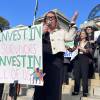The state spending plan rolled out by Senate leaders Thursday sets up even bigger changes for the way education is funded in Massachusetts, and boosts several areas senators see as key to improving the working and family lives of the poor.
1. It's a "hopeful" budget.
The Senate wants to spend $20 million more than the House of Representatives next fiscal year, with spending on education playing a key role in the final budget from Ways and Means Chairwoman Karen Spilka before she takes the reigns as Senate president in July.
Revenues for this coming budget year are predicted to outpace last year, meaning budget writers can more comfortably spend on lawmakers' priorities.
"Our revenues are coming in. We're positive. Our outlook seems to be better," Spilka told WGBH News.
Much of the the Senate's $41.4 billion spending plan is taken up by the steadily rising cost of providing health care for the state's poorest citizens. There's little left in discretionary accounts for lawmakers to appropriate after the MassHealth insurance program, over 40 percent of total state spending, is accounted for. Additional Health and Human Services programs take up another 15 percent.
2. Raising education funding in the short term and (hopefully) fixing it in the long.
The third largest slice of the budget pie, around 14 percent, or about $6 billion, goes to cities and towns for kindergarten through grade 12 education and other municipal needs.
Spilka has focused much of her spending priorities on aiding cities and towns struggling with the rising costs of educating students and paying the employees who do the work. Spilka said her budget makes progress funding three of the four main recommendations put forward by a commission to redesign the formula the state uses to fund schools.
"The state needs to step up and fulfill its obligation as best as it can, and this is a priority in the Senate Ways and Means budget," Spilka said.
The Senate will pass a bill Thursday to commit to fully funding the changes set out in the commission's report, which calls for billions more spent throughout the state. Revenue-watchers expect only around 3.5 percent more in the state's coffers through the coming fiscal year, leaving many to question where the Senate plans to get the money to fund what it's promising.
"This [budget] is partially how you pay for it," Spilka said.
The Senate is proposing raising funding for schools by $160 million over last year's spending. The plan also goes further than the one approved by the House last month in district reimbursements for special education students and for students attending charter schools, both areas of the Chapter 70 funding law that local leaders have argued need an infusion of cash.
"In the budget, we implement certain pieces of that to make a good faith effort to try to start showing the public that we are taking this [seriously], that we need to implement that and make some changes to the Chapter 70 [formula,]" Spilka said. "I wish we had more, but there are so many other needs in the budget, from our veterans, our seniors, our disabled, our Health and Human Services."
To fulfill the Senate's promise to fund schools, Spilka and other state leaders are looking toward the surtax on incomes over $1 million voters could be asked to approve at the ballot this fall. Spilka won't say if she's open to raising other taxes to provide the funds, should that vote fail, or should the question not make it the ballot.
"That is another discussion for another day. We will have other opportunities to discuss that later on," Spilka said.
3. Helping the poor find jobs, get to work and raise their kids.
Under Spilka's budget, $30 million would go to basic education services for adults trying to join the workforce, with another $12.5 million for young people and at-risk youth looking for training and summer jobs.
Spilka is also focused on improving transportation systems in much of the state outside Boston. The plan includes $88 million for regional transit authorities, mostly bus systems in and around the state's mid-sized cities. The plan also calls for future funds to be tied to inflation, answering some calls from gateway cities and others who rely on buses that regional transportation funding has not been keeping up with rising costs.
"It doesn't matter where a person lives or what their zip code is. We try to help all people in all regions. Regional equity is an important aspect of the budget as well,"
The budget would raise the state's match of the Earned Income Tax Credit for working families from 23 percent to 30 percent of the federal rate, lift the "cap on kids" that prevents welfare recipients from collecting additional funds for children born while receiving benefits and increase the allowance for children's clothing to $350 per year for children in families receiving benefits.





